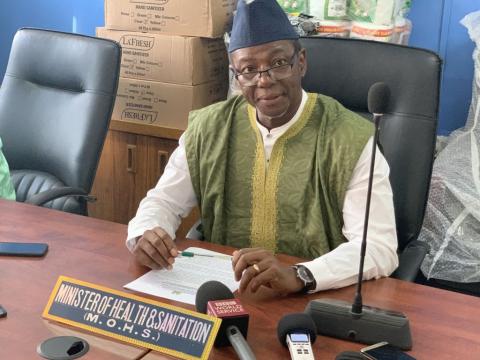By Kemo Cham
The northern region of Sierra Leone has got its first biosafety laboratory with the inauguration over the week of the first Covid-19 testing lab in Makeni.
Minister of Health and Sanitation, Prof. Alpha T. Wurie, presided over the symbolic inauguration ceremony hosted at the Wusum Hotel in Makeni City.
Officials say the lab will enhance the country’s covid-19 response effort, thereby reducing turnaround time for testing for districts in the northern region.
Before now Makeni and its neighboring districts transferred their specimens for testing to either Freetown or Kenema, which not only expose those transporting them to risk of infection, but also caused delay which impacted the response efforts.
Prof. Wurie described the event as a land mark achievement that once again demonstrated the power of collaboration among government and its development partners. He said the creation of the lab is also an illustration of the government’s commitment to strengthening the health sector, as part of the Bio Administration’s development agenda.
Makeni, the headquarters of the Bombali District, is the largest and most important town, both economically and politically, in the whole northern region of the country. The city is also home to the regional government hospital, within which the laboratory is located.
When the Covid-19 pandemic began in Sierra Leone in March, the country had only three biosafety labs with the capacity to test for the virus, all of them located in the West Area (Freetown and its surrounding).
Five months on, there are now six such labs.
This, said the Health minister, represented a major leap in the country’s scientific journey in responding to health emergencies,
“This is a unique day,” he said at the inauguration event in the conference hall of Wusum Hotel.
“Our science base is getting better and better. Soon we hope to be able to expand the skills into clinical laboratory in 2021, so this will not only be a public health intervention, but a clinical one as well,” he added in an interview with the press outside the hospital facility after an inspection of the lab.
Wurie also said that Sierra Leone had gone a long way in developing its human resource capacity, noting that during the Ebola epidemic, every response efforts, from testing to surveillance, where handled by foreigners, and that the testing was even done outside the country.
The inauguration of the lab is a culmination of months of collaborative work involving the government, the World Health Organization (WHO), and the US Centers for Disease Control, among a host of other local and international partners, which provided technical and financial support to rehabilitate the lab, procure and install the equipment.
The lab was built by the CDC Foundation though the Child Health and Mortality Prevention Surveillance [CHAMPS], a project run by a consortium of local and international NGOs whose main goal is to prevent under-five deaths.
The laboratory equipment were procured through funding from WHO, which said it is part of its ongoing efforts to strength Sierra Leone’s health sector.
WHO Country Representative, Dr Evans Liyosi, reiterated that the lab demonstrated the power of collaboration, noting that the project was the result of the UN health agency’s continued efforts in addressing Sierra Leone’s human resource capacity with regards to the response to the ongoing pandemic and beyond.
Dr Liyosi noted that the establishment of the lab in Makeni will occasion an end to the trouble of having to rely on Freetown and Kenema for testing, which hindered the response effort.
“This is going to change completely,” he told the press outside the hospital.
“This is building confidence, this is building capacity for public health and I think it’s the way to go,” he added.
Local authorities, including representatives of the Makeni City mayor and Paramount Chiefs, praised the move by the government to establish the lab, which they hope will accelerate their response to the pandemic.
Copyright © 2020 Politico Online








